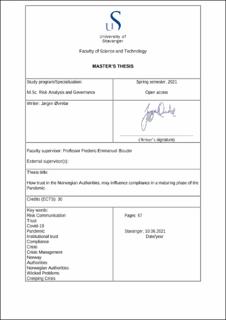| dc.description.abstract | This Master Thesis have examined the relationship between risk communication and trust in Norwegian Authorities through the Covid-19 Pandemic. The thesis started with a hypothesis that risk communication will influence trust – and that trust is a key component that contributes to compliance. The research question more specifically;
How risk communication from Norwegian Authorities influences trust in a maturing phase of the Pandemic. Sub-question: How is the pandemic likely to influence the level of trust in the Norwegian Authorities? And may this influence compliance?
To examine this, an exploratory mixed-methods design was adopted, in two sequential phases. In short, collecting quantitative data and then qualitative data to help explain or elaborate on the quantitative results. A total of 809 responses were collected in the initial quantitative survey, in which a data analysis was done through SPSS. The analysis displayed that there is a correlation between perception of risk communication and trust, supporting the initial hypothesis. The analysis further found that age is a contributing factor in the level of trust related. Higher age was aligned with higher levels of trust. The survey also found that the trust level in Norwegian Authorities are generally high – and questioned if some lower scores were related to disagreement to measures rather than trust itself. The second sequence of data were gathered through 12 in depth interviews, to elaborate on the initial findings. The interviews confirmed that the trust level is generally high and that the lower scores are primarily related to disagreement towards the Authorities` chosen strategy / decisions. In other words, it was not in general about distrust. Rather a form of critical trust, where trust can be high even if people have different opinions on what would be the best solutions to the situation. This is often a healthy sign of a functioning democracy and even if people have different opinions, it doesn`t necessarily influence compliance. The data collected also illustrated that the perception of risk and concern amongst laymen is not always aligned with expert evaluations, such as concerns related to mental health – which both the survey and interviews rated a higher concern than what expert reports have found to be the case. One major challenge moving forward, will be to handle the growing disagreement towards intrusive measures established to prevent spread. Even if the trust has remained high together with strong compliance, there are clear signs of a steady decline in agreement towards the decisions related. This may influence the trust level negatively unless the Authorities manage to counter it effectively. There are examples from other countries displaying that when trust levels drop significantly, compliance deteriorates too. The main dilemma moving forward will most likely be related to perceptions of fairness in measures and the socio economic considerations vs health and safety. This is also where the expert groups have differed lately. Such as the Holden commission`s (socio-economic expert group) proposed vaccination strategy somewhat different than the Health Authorities recommendations. And this leads to the major challenge of risk communication at this stage. The nature of the pandemic is that most decisions that aim to serve a certain aspect is likely to influence other aspects negatively. The balance of health vs socio economics may be the most visible example. The Norwegian Authorities should expect a continuing growing disagreement from various stakeholders for as long as intrusive measures are required. This should be monitored closely to be able to justify the decisions with support from the relevant experts, to maintain the trust and compliance high. | |
